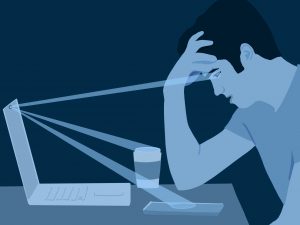
The coronavirus isn’t the only school problem sweeping the nation this year.
As more and more students have been sent to online schooling, concerns of academic dishonesty have grown. And with it, anti-cheating softwares and privacy concerns have followed hand-in-hand.
Chapman has implemented Proctorio, an anti-cheating software, which can record you, your room and your web browsing while taking an exam.
Many students have expressed concerns that the virtual proctoring software is “creepy” and invasive and even “ableist.”
“I’m gonna take tests naked if they’re gonna do this,” said Chapman University senior economics major Rob Farmer.
As students and professors adjust to remote learning, academic dishonesty has become a greater concern. Remote teaching has forced professors to give online exams which can be hard to monitor for cheating.
According to a May survey conducted by digital education company Wiley, 93% of instructors think that students are more likely to cheat online than in person.
As a result, colleges like Chapman have implemented anti-cheating softwares to address concerns of students cheating during online exams.
Co-director for the Institute for Excellence in Teaching and Learning, Jana Remy said, “Chapman adopted Proctorio because faculty asked for software to both deter and detect academic dishonesty on exams while teaching remotely.”
For example, before the coronavirus, another software, ProctorU, caught people cheating on fewer than 1 percent of the 340,000 exams it administered from January through March. During the height of remote testing, the company says, the number of exams it supervised jumped to 1.3 million from April through June, and the cheating rate rose above 8 percent.
According to Instructional Analyst Julie Johnson’s Introducing Proctorio, Info for Students, an article explaining Chapman’s use of Proctorio to students, Proctorio and many other anti-cheating softwares that have arisen during the pandemic uses machine learning to capture audio, motion, and facial identification to flag suspicious behaviors that are seen as cheating.
Here’s how it works:
Proctorio is a chrome extension. Students need to download the extension before taking the exam – meaning they have to use google chrome as their browser for the test. When professors choose to administer a test through Proctorio, they can go through a list of settings for what will and will not be allowed during the exam. For example, professors can prohibit students from opening new tabs and lock the student into full screen for the duration of the exam. Professors can also choose to monitor students’ surroundings, asking them to film their room at the start of the exam to prove that there are no hidden notes off screen or people in the room to help them cheat.
However, what is and is not allowed during the exam is up to each professor. Professors choose settings for how the exam will be proctored.
According to Johnson, “Those settings include recording you and the room you are in via your webcam, recording your web browsing during an exam, locking down your web browser, and disabling printing.”
Some Chapman students are worried about the invasion of privacy that being filmed presents with these softwares.
“If professors are so concerned with the possibility of cheating, lock down browsers should be sufficient,” said senior health science major Sarah Shattuck. “No professor was tracking eye movements in person- why do they need it now? We’re also in the midst of a pandemic, how about we give students a break.”
These concerns are not unique to Chapman however, thousands of college students have signed petitions to cancel online-proctor deals in California, Colorado, Florida, Massachusetts, New York, Ohio, Texas, Wisconsin and Washington, according to the Washington Post.
However, according to Remy, unlike other proctoring softwares, “Proctorio adheres to all student privacy rights in accordance with FERPA. Additionally, there are no human proctors who monitor students while they are taking an exam.”
While no human proctors will be monitoring students during the exam, professors do have the option to review video of students taking exams afterwards.
Aside from privacy concerns, many students at Chapman and across the United States are worried about the limitations of automated software, especially for those with learning disabilities.
Although Chapman has learning disability services for in-person learning, many students feel that the school has failed them when it comes to this new software.
“This is an extremely ableist system that should not be employed by Chapman for testing,” senior film production major Olivia Fouser said.
For students with a variety of different issues, being filmed and tracked while testing presents anxieties.
“For people with learning disabilities this might make things harder for them.” sophomore broadcast journalism and documentary major Imanni Wright said. “For some, that may have anxiety that makes things worse for them as well even if they know the material. Academic anxiety is already a huge problem and this adds to that along with other anxieties especially with Covid-19, the election and other things happening in our country.”
These fears are not merely a figment of the imagination, there have been several viral examples of real students suffering the wrath of anti-cheating softwares.
For example, an anonymous user created a Twitter account called @Procteario in which they share different tweets about student experiences with Proctorio.
In addition, in one viral TikTok, a student failed a test because she was reading the questions aloud to herself, and she caught her mental breakdown on camera.
Despite the software’s exhaustive ability to monitor for academic dishonesty, some feel that students who want to cheat will always find a way.
“On one hand I understand,” said a student who preferred to stay anonymous. “Almost everyone has been academically dishonest in some way since all classes went online, which is obviously not what the administration wants. On the other hand, as a student I almost feel a little offended that the administration doesn’t trust us, although they really have no reason to. It feels a little dirty on their part, especially with the excessive precautions. There are also ways to get around it, students will almost always find ways to cheat, so it might not have the desired effect that the administration wants.”
To some students, Proctorio emphasizes a lack of trust between professors and students.
“It feels like an invasion of privacy, and it’s also a clear statement that Chapman expects the worst of us,” said senior business major Aubrey Doerr. “In all honesty, I think it’s just another thing students are going to have to be worried about, especially if Proctorio is going to be used for assignments that would have been online regardless of the pandemic. Chapman would do well to just give us a break.”
Students struggling physically, mentally, financially, and academically are finding it hard to maintain motivation for online classes.
“It’s almost cruel to be implementing Proctorio during this time, everyone is trying their best to just make it through the year. Just leave us alone, you know? We’re already having a rough time as it is,” said Doerr.


